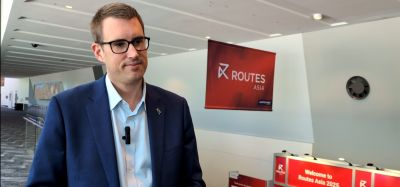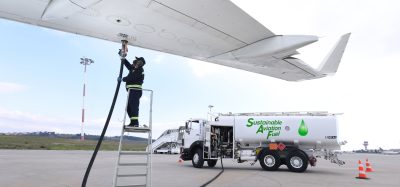ASA fuel services: focusing on the client
- Like
- Digg
- Del
- Tumblr
- VKontakte
- Buffer
- Love This
- Odnoklassniki
- Meneame
- Blogger
- Amazon
- Yahoo Mail
- Gmail
- AOL
- Newsvine
- HackerNews
- Evernote
- MySpace
- Mail.ru
- Viadeo
- Line
- Comments
- Yummly
- SMS
- Viber
- Telegram
- Subscribe
- Skype
- Facebook Messenger
- Kakao
- LiveJournal
- Yammer
- Edgar
- Fintel
- Mix
- Instapaper
- Copy Link
Posted: 1 August 2008 | Alejandro Ríos, Director, Fuel Services, Aeropuertos y Servicios Auxiliares | No comments yet
In these uncertain times of skyrocketing fuel prices, all stakeholders (airlines, suppliers, into-plane agents) need to devise intelligent strategies to reduce costs and face the market conditions together. In this regard, ASA fuel services (AFS) has a structured management system that puts the client as its utmost priority. It encompasses the areas of quality, the environment, occupational health and safety, as well as an extensive human resources development programme, all of which contribute to the organisation’s knowledge management system.
In these uncertain times of skyrocketing fuel prices, all stakeholders (airlines, suppliers, into-plane agents) need to devise intelligent strategies to reduce costs and face the market conditions together. In this regard, ASA fuel services (AFS) has a structured management system that puts the client as its utmost priority. It encompasses the areas of quality, the environment, occupational health and safety, as well as an extensive human resources development programme, all of which contribute to the organisation’s knowledge management system.
The Fuel Management System (FMS), as it is integrally known, delivers value to ASA’s clients by reducing costs, and bolsters client confidence through its international certifications in ISO and OHSAS. In addition, recent specific strategies targeted toward reducing jet fuel costs have resulted in savings across the supply chain.
Brief history of ASA
Aeropuertos y Servicios Auxiliares (ASA) is a Mexican government agency with 40 years of experience in airport planning, design, construction, operation and administration. This extensive background is supported by the broader experience and knowledge of its personnel, many of whom have been engaged in these activities and other specialised areas for more than four decades. These highly experienced professionals have successfully responded to Mexico’s diverse geographic conditions to build airports in areas characterised by differing landscapes, climates, mountains and altitudes. Accordingly, they have built passenger facilities reflecting the type of services required by each region, and with the highest possible international quality and efficiency standards have performed operating activities at both the individual airport level and as part of the national network.
In 1965, after its inception ASA received 34 airports, most of which were characterised by precarious, deficient facilities that significantly hindered the operation of new aircraft and the possibility of satisfying the rapidly growing demand. As of that year, under the supervision of the Ministry of Communications and Transportation (MCT), ASA began work to promote infrastructure modernisation and growth, specifically focusing on the areas of design, technology and operations. Over the years, ASA’s network of airports grew to 65, covering the entire country.
In 1979, the Mexican Federal Government decided to bring all of the jet into-plane agents under one roof, thus leading ASA to acquire the two other companies in operation at the time. There are a number of independent into-plane operators around the country today, but they are limited to the private aviation sector, and they work only in individual airports or hangars.
The financial crisis of the 1980s had a severe effect on airport development in Mexico. Consequently, during the mid 1990s the Federal Government decided to modernise and extend the country’s airport infrastructure as a means of enhancing economic growth. It therefore promoted private investment and amended the legal framework, a process that was concluded in 1998 with the privatisation of Mexico’s 34 most profitable airports. This decision converted ASA almost overnight from a primarily airport operator into a Fuel Services company, as all 65 fuel farms and into-plane operations remained within ASA’s domain.
Today, ASA is organised around three main areas; the Business Units Coordination, the Institutional Coordination and the Corporate Services Coordination. The Business Units Coordination is responsible for a further three main areas; the Airport Operations Area (which currently wholly manages 19 airports plus five more in cooperation with state governments and the private sector), the Fuel Services Area, and the Consulting and Business Development Area. The Institutional Coordination is in charge of all government and outside relations of the enterprise, as well as ASA’s internal process supervision. The Corporate Services Coordination houses all of the support functions for the agency, such as the Finance, Information Technology and Administration areas.
Who are ASA fuel services?
ASA fuel services (AFS) is the business unit in charge of the reception, storage, quality control and into-plane refuelling of aviation fuel for the entire Mexican Airport Network (63 stations). The geographical coverage of AFS is depicted in Figure 1.
The key statistics of the business are a workforce of 1,305, 500 supply and support vehicles, 2450 services per day, 11.5 million litres per day and 120 million litres of stock capacity. In 2007, nearly four billion litres were supplied through 896,000 into-plane connections.
AFS is an IATA strategic partner that actively participates in the Aviation Fuel Forums organised twice a year. Being an IATA partner allows ASA to be close to its customers, learning their needs firsthand and helping the industry move forward, while staying abreast of new developments.
Mexico has a National Oil Monopoly (Petroleos Mexicanos – PEMEX) that controls all transactions concerning petroleum and its derivatives. PEMEX produces enough jet fuel for its domestic market, with occasional surpluses that are sold in the international spot market. The set up of the jet fuel market in Mexico is as follows: PEMEX sells the jet fuel to ASA, who in turn sells it to its customers, the airlines and private pilots. ASA had sales of over two billion US dollars in 2007 from its Fuel Services Business Unit.
Introduction to ASA fuel services’ Fuel Management System
Based on the principles set forth by the theory of management of the last three decades, and having undertaken a diagnostic of the financial and operational conditions of the business in 2001, AFS designed and implemented an integrated management system, known today as AFS’s Fuel Management System (FMS). The main objective was to create a framework that would allow AFS to meet the needs of its clients, through process standardisation, resource optimisation, technology innovation and having a motivated and professional workforce. The FMS has five main subsystems:
- Quality Management System
- Environmental Management System#Occupational Health and Safety Management System
- Human Resources Management System
- Knowledge Management System
Under the Quality Management System, all processes are documented and standardised so that customers can value the services they receive. Quality assurance is about making sure that the repetitive processes that aviation refuelling entails are done with the utmost care and efficiency, providing a certainty to clients that can be measured.
The aviation fuel industry is by definition a burden to the environment. As such, it is imperative that all industry participants take an active role in making sure that pollution control systems are in place. Through its Environmental Management System, AFS has implemented a number of initiatives to control harmful emissions and potential spillages; as well as restoring soil and groundwater to their original conditions through specialised characterisation and remediation works. Knowing the environmental footprint of fuel farm administration and into-plane refuelling perhaps does not add value directly to AFS’s clients; however, it supports its image as a socially responsible entity that directly looks out for the public’s interest.
One of the main concerns of any client in the jet fuel industry is safety. As the numerous incidents and accidents around the world attest, jet fuel management is a dangerous activity, and great care must be taken to avoid any potential mishaps. The standardisation of processes helps, but there is a further need to deploy safety strategies that can guarantee secure activities. The Occupational Health and Safety Assessment Series (OHSAS) guidance material has been the basis for AFS’s management subsystem in this area. Everything from personal protective equipment to the revision and maintenance of fire extinguishers is included within its scope.
Fuel farm administration and into-plane refuelling are classified as service industries. In order to provide a high level of service, the people dimension takes on a special role. The technicians that are physically providing the service under the aircraft’s wing are the most important people in the company. It is imperative that they feel motivated and that they have the right tools and equipment to do their job. It is equally important that they receive the appropriate training and coaching, primarily to guarantee a professional standing, but also so that they are ready and prepared whenever an incident occurs. AFS’s Human Resources Management System focuses on strengthening the competencies of all those within the organisation so that clients can rely on a safe and proper experience.
The Quality, Environmental, Occupational Health and Safety and Human Resources management systems all feed and receive information to and from AFS’s Knowledge Management System. The backbone of this subsystem rests on the concepts of Business Process Management (BPM) and Service Oriented Architecture (SOA). The information technologies that support these practices are:
- Fuel Portal: based on IBM’s® WebSphere technology, the portal allows for the integration of all technologies into a cohesive platform from where other systems can be managed
- SCADA: the Supervisory Control and Data Acquisition system integrates hardware (radars and turbines for measurement) and software, and allows for the inclusion of all field information into a comprehensive database
- AVR 2000: this fuel supply system has the capability to generate invoices at the point of refuelling with complete synchronisation with all relevant information
- Electronic Documents of the FMS: an electronic library of all the process documentation that is completely hyperlinked for fast and accurate consultation
- ERP: financial package for managing customers and invoicing
- E-Learning: this system allows for the dissemination of information and the teaching of training courses on a web-based platform
- Project management: based on the principles of the Project Management Institute (PMI), this system permits centralised data management and administration of projects through high end CPM & PERT technology
- FICC: the Fuel Information and Control Centre is a monitoring unit that uses CCTV via web which allows close supervision of all installations across the country
Important results
Through the FMS, ASA has obtained ISO 9001:2000 (Quality) and ISO 14001:2004 (Environment) certificates for its operational process of reception, storage, quality control and supply of jet fuel in 35 of its stations. This means that over 90 per cent of the fuel that is handled is covered through these certifications. In fact, the five biggest stations handle over 70 per cent of the fuel that ASA sells: Mexico City (MEX), Cancun (CUN), Guadalajara (GDL), Monterrey (MTY) and Tijuana (TIJ).
In addition to ISO, as a pilot project AFS has obtained the OHSAS 18001 certification for occupational health, security and safety at the stations of Villahermosa (VSA), Bajio (BJX) and Zacatecas (ZCL). This is in line with the search for a more secure working environment and a better relationship with the union, its workers and all clients.
The implementation of the best practice approach has had other important benefits. There have been major productivity gains and cost reductions through the reengineering of many processes. Specifically, in the into-plane supply process where every operation was carried out by two technicians, it is now done by a single person due to the acquisition of new equipment (a significant part of the service vehicle fleet – refuellers and dispensers – has been modernised). These actions have enabled AFS to keep the tariff schedule intact while achieving ever higher levels of service and customer satisfaction.
On the human resources front, one of the major accomplishments has been the creation of the Technical Baccalaureate in Aviation Fuel in association with one of the major higher education institutions in Mexico, the National Polytechnic Institute. Upon completion of their studies, AFS’s workers receive a technical degree that is recognised by the Ministry of Public Education, and is valid for continuing at the bachelor level in the engineering area. This is one of the first programmes of this kind worldwide.
Additional cost reduction strategies
All of the actions that have been described up to this point have had an internal focus, i.e., they have been geared toward the organisation itself. Recently, because of the increase in the price of oil, there have been a number of initiatives that have focused on the extended supply chain. Three specific strategies have been implemented that have the potential of having an impact on the transportation costs from the distribution and storage terminals of PEMEX to the different airports across the country:
- Revision of the contract with PEMEX: this will reduce the transportation costs as demand forecasts are updated to current levels and additional volume charges are practically eliminated
- Importing fuel from international markets: at some airports across the Mexico-US border, it makes more sense to import the fuel from the United States, as the refineries in Mexico are farther away
- Building new pipeline infrastructure: the only airport in Mexico that receives jet fuel via pipeline is the Mexico City International Airport. All other airports receive fuel via tanker trucks. This strategy looks into building pipeline infrastructure into the airports of Cancun, Guadalajara and Monterrey, the three largest after Mexico City.
Outlook toward the future
ASA fuel services have created a solid platform that creates value for its clients by implementing the best practices known at the international level. The strengthening of its internal processes and the certainty that the international certifications bring generate confidence and credibility throughout its client base. The Fuel Management System is the cornerstone of AFSs’ strategy to expand into new markets as the inevitable consolidation in the industry, looking for cost savings across the board, takes place.


Figure 1: Network of fuel farms managed by ASA fuel services

















